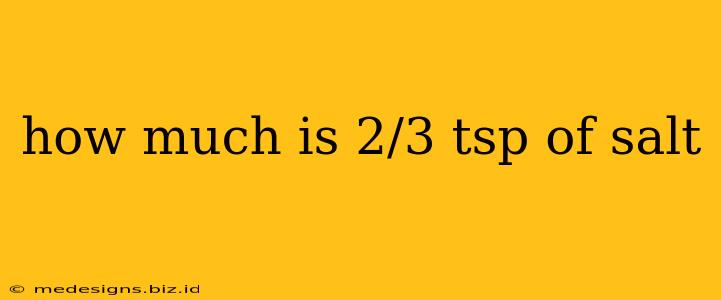How Much is 2/3 Teaspoon of Salt? A Quick Guide to Measuring
Need to measure 2/3 of a teaspoon of salt, but don't have the right measuring spoons? Don't worry, we'll help you figure out how to get the right amount. Understanding how to accurately measure ingredients is crucial in cooking and baking, where precision can make all the difference.
Understanding Teaspoon Measurements
A teaspoon (tsp) is a common unit of volume in cooking and baking, typically equal to approximately 5 milliliters. However, the exact volume can vary slightly depending on the type of measuring spoon. This is especially important when working with smaller fractions like 2/3 of a teaspoon.
Methods for Measuring 2/3 Teaspoon of Salt
There are several ways to accurately measure 2/3 of a teaspoon of salt:
1. Using a 1/3 Teaspoon Measuring Spoon: The easiest method is to simply use a 1/3 teaspoon measuring spoon twice. This will give you exactly 2/3 of a teaspoon.
2. Using a 1/2 Teaspoon Measuring Spoon: If you only have a 1/2 teaspoon measuring spoon, fill it up and then gently remove approximately one-third of the salt. This requires a bit more estimation, but with practice, you can get quite close.
3. Using a Mark on a Teaspoon: Some teaspoons have markings on the side indicating fractional measurements. Check your teaspoon to see if it has these markings; this will provide a precise measurement.
4. Using a Small Scale: For the most accurate measurement, you can use a kitchen scale that measures in grams or ounces. You'll need to know the weight of a teaspoon of salt (approximately 6 grams) and then calculate 2/3 of that weight (approximately 4 grams).
Tips for Accurate Salt Measurement
- Level the spoon: When measuring salt, ensure your measuring spoon is level. Don't pack the salt down, as this will lead to inaccurate measurements.
- Use the right tool: Using the appropriate measuring spoon for the job is essential for accuracy.
- Practice makes perfect: The more you practice measuring, the better you'll become at estimating fractional amounts.
Why Accurate Measurement Matters
Precise measurement is vital for cooking and baking for several reasons:
- Taste and Flavor: Too much salt can ruin a dish, while too little can leave it bland. Accuracy helps maintain the intended balance of flavors.
- Texture and Consistency: Salt affects the texture of many foods, particularly in baking. Precise measurements help achieve the desired texture, whether it be a soft cake or crispy cookies.
- Chemical Reactions: In some recipes, salt plays a role in chemical reactions, and inaccurate measurement can lead to unpredictable outcomes.
By using these methods and following the tips above, you can easily and accurately measure 2/3 of a teaspoon of salt for your next culinary creation. Happy cooking!
